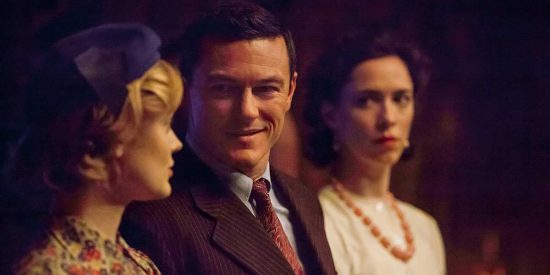TIFF Review: Professor Marston and the Wonder Women – “An incredible story”
Hollywood has been obsessed with superheroes for some time now, but no more so than in the past decade. Ironman, Spider-Man, Superman, Batman – all of these icons have one thing in common: the word man in their title. Until this past year, no major female superhero existed cinematically on the big screen. When she appeared however, she broke box office records and started a phenomenon.
Riding the wave of that phenomenon is another type of origin story, Professor Marston and The Wonder Women. The film follows the story of Dr. William Marston (Luke Evans), a psychology professor in the 1930s at Harvard (well, the Harvard campus who allows women) who, along with his wife Elizabeth (Rebecca Hall) are doing research on a lie detector. The professor is also well known for his teaching of DISC theory, which centres around four different personality traits – dominance, inducement, submission and compliance.
When the pair meet a new student, Olive (Bella Heathcote) they both immediately become intrigued by the young woman. She is incredibly beautiful, intelligent, shy, yet immediately striking and is hired as William’s teaching assistant. Elizabeth initially warns the girl to not sleep with her husband, despite giving William permission. However, once the trio spends more time together it becomes incredibly evident that they share an indescribable type of love. Rebelling against the sexual taboos of the era, the three begin an intimate affair, and eventually life together. It is from William’s love and respect for these two women that Wonder Woman is eventually born.
The film is an incredible story that clearly became a passion project for writer/director Angela Robinson. It’s full of feminist messaging, though never overbearing, showing Marston’s attempt to give young girls someone to aspire to even through Wonder Woman’s often sexual depictions in early comics. Not surprisingly, this got him into trouble with some decency committees (where Connie Britton argues against his perceived impropriety).
Robinson has crafted a tender and intimate portrayal of an unconventional family, including probably the most beautifully, tastefully shot threesome scene you’ve likely ever glimpsed in cinema. Her use of interspersing original panels from the first Wonder Woman comics becomes a wonderful device to drive home the nature of Marston’s original ideas and his method to inject his psychological theories onto the pages.
Casting here is brilliant, with Hall, Evans had Heathecoate sharing a palpable chemistry. Without them, it’s easy to see how the film could have fallen a little flat, but it’s very easy to fall in love with this family and their tender way with one another. All of the cast is incredibly strong. Evans is incredibly likeable as William, Hall brings a certain bravado to Elizabeth – confident and assured. But, it is Heathecote who allows Olive to shine, and she grows with her. Witnessing her transition from a timid young girl to a self-reliant woman is part of the beautiful journey.
The origin story of Wonder Woman may not be what you expect (unless you read The Secret History of Wonder Woman), but it is certainly one of the most interesting stories you’ll see. Think about it – a polyamorous relationship in the 1930s. The film never forces on you what must have been a terrible burden on the family from the outside world. Though their love ostracizes them from society they find their own way that allows you to question, as they do in the film, “What is normal?” And also why societal ‘normal’ matters. Through their journey, it becomes incredibly clear that Wonder Woman was NOT the only hero in this story.
It is due out in the UK on 10th November 2017.











